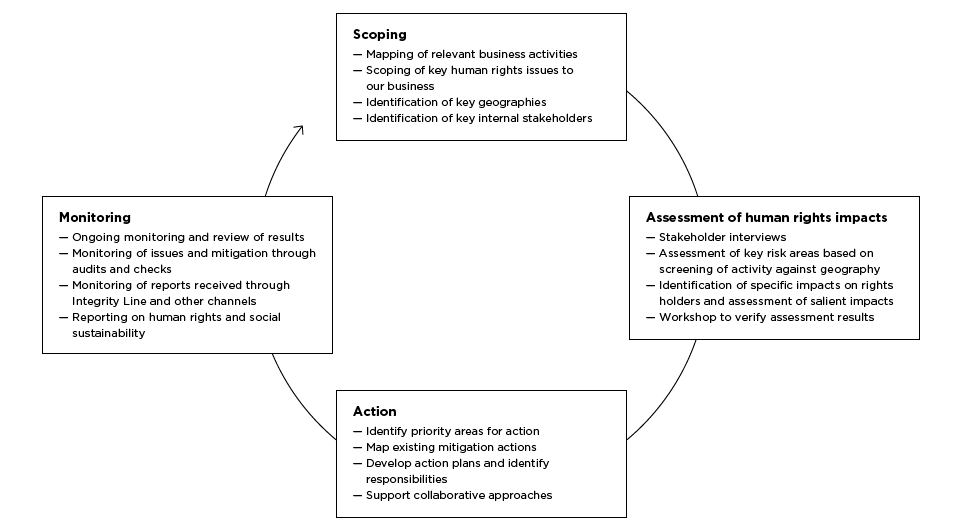Human Rights
Disclosure 103-1 Explanation of the material topic and its Boundary
Respecting human rights is key to sound business governance and for promoting socially sustainable growth. Clariant is committed to supporting human rights, both in its own operations and in its supply chains. It expects suppliers and business partners to maintain the same high human rights standards, as it is a prerequisite for any company’s license to operate.
Disclosure 103-2 The management approach and its components
Under the lead of Corporate Sustainability and Regulatory Affairs (CSRA), the Human Resources, Legal, and Procurement departments have a shared responsibility for managing human rights.
Clariant’s commitment to respecting human rights is enshrined in its Human Rights Policy Statement, adopted in 2015, in which Clariant reaffirms its commitment to the United Nations Human Rights Declaration and the ILO Declaration on Fundamental Principles and Rights at Work. The policy statement applies to all direct operations and activities, and articulates a clear expectation of suppliers and contractors to uphold the same standards.
In addition, requirements regarding key human rights principles are included in Clariant’s Code of Conduct, the Code of Conduct for Suppliers, and the Employment Standards Guidelines, which protect workers’ rights with regard to non-discrimination, forced labor, child labor, fair working conditions, freedom of association, privacy, effective remedies, and workplace health and safety. The Code of Conduct is binding for Clariant’s direct operations, including all joint ventures that are controlled by Clariant or in which it holds a majority interest. The Code of Conduct for Suppliers extends to Clariant’s suppliers and their contractors. The rights of community members—particularly regarding environmental health and safety—are a key priority for Clariant. Thus, it protects them with a comprehensive set of binding environmental, health, and safety rules.
Clariant is a signatory to the UN Global Compact. It also strongly supports collaborative initiatives that promote sustainability and respect for human rights across the industry as a member of Together for Sustainability (TfS) and the Roundtable on Sustainable Palm Oil (RSPO).
In 2016, Clariant carried out a human rights due diligence assessment with the support of external human rights experts in order to evaluate the potential human rights impacts of its operations and activities, as well as the effectiveness of the management and monitoring systems in place. The accompanying graph illustrates the key elements of the due diligence process.

Through a series of interactive working sessions, several key functions and departments prioritized activities based on their scale and relevance to the business and their probability of having adverse effects on the human rights of workers, communities, and other groups. A human rights assessment was then carried out for a number of priority activities, integrating both internal and external risk factors, such as complex subcontracting arrangements and vulnerabilities of specific groups, as well as aggregate human rights risk levels of countries and industries. The evaluation of environmental and social impacts, as well as labor rights in Clariant’s own operations and along its supply chain, played an important role in determining to what extent Clariant appropriately mitigates adverse human rights impacts.
The assessment found that Clariant has a comprehensive set of policies, guidelines, and processes in place to ensure the implementation of its human rights commitments. In addition, it found that specific mitigation actions had been conducted for some of the high-risk areas identified in the human rights impact assessment. The assessment further concluded that Clariant’s potential human rights impacts primarily relate to contract labor and the supply chains for natural raw materials, particularly in geographies with weak national legal frameworks.
Building on this assessment, in 2017, Clariant carried out a review of the legal requirements, conditions, and control measures related to contract labor in India. The review found that the country organization is well aware of the legal requirements and has implemented a clear and comprehensive process, supported by detailed evidence, checklists, and regular exchanges with authorities.
In 2017, the Clariant Global Employment Standards Policy was fundamentally revised. The updated policy sets binding key principles and applies to all companies of the Clariant Group, which are fully financially consolidated by Clariant International AG (Switzerland), as well as to employee agencies and contractors that collaborate with Clariant or engage on behalf of Clariant.
Addressing and closing the identified gaps in Clariant’s mitigation framework is a priority for Clariant in the coming years. Regarding the supply chain, Clariant will continue mapping the origin of particular raw materials to gain a better understanding of its potential human rights impacts, especially in high-risk countries.
Disclosure 103-3 Evaluation of the management approach
Clariant relies on well-established management and monitoring systems that enable the company to detect and mitigate potential human rights risks. In the future, Clariant will further align and streamline its activities and review the need for additional internal human rights trainings. The evaluation of the management approach includes benchmarking against Clariant’s peers, using external benchmarks such as the Dow Jones Sustainability Index, and participating in external networks, discussions, and report reviews.